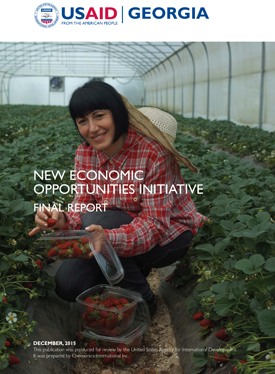By focusing on economic development in rural communities, Georgia was able to reduce poverty levels and improve food security for thousands of people.

Final Report: Georgia New Economic Opportunities Initiative .
Project Report | December 31, 2015

The USAID New Economic Opportunities Initiative promoted economic growth, resulting in broad-based impact that yielded beneficial results for 81,208 Georgian households.
In its first 25 years of independence from the Soviet Union, Georgia’s successes have set it apart from others in the region, yet the country still faces an array of challenges, including entrenched poverty for much of the rural population. Many impoverished rural households depend on subsistence farming and lack the technical skills and financing needed to begin businesses or to pro- duce greater harvests. In April 2011, USAID launched the New Economic Opportunities (NEO) Initiative, a $22 million,1 five-year project that improved rural incomes, reduced poverty levels, improved food security, ad- dressed critical small-scale economic infrastructure constraints in targeted communities, enabled targeted communities of IDPs to sustainably maintain their households, and assisted communities affected by natural or other disasters.
